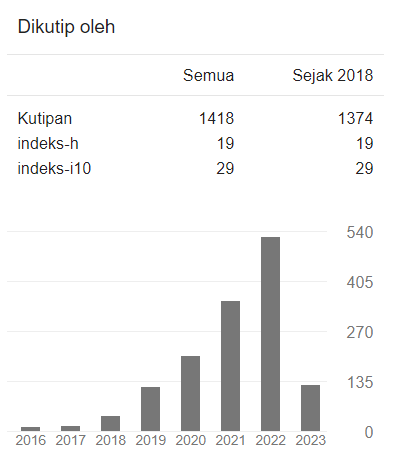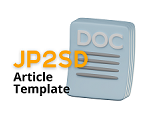Teacher Thinking Process in Providing Scaffolding in the form of Questions in Mathematics Learning
DOI:
https://doi.org/10.22219/jp2sd.v12i1.33466Keywords:
Proses Berfikir guru , Scaffolding, Pembelajaran Matematika, Dominan Kontingen Analitis, Dominan Kontingen IntuitifAbstract
Two things must be considered to realize teacher professionalism: the teacher's thinking process and actions. These two things are very important and influence each other. The teacher's activity in providing scaffolding for students' questions is an action that certainly requires a thinking process. Among the research that has been carried out is teacher actions in providing scaffolding; however, there is no disclosure of teachers' thinking processes in helping students with difficulties in solving numeracy questions. Implementing questioning scaffolding in learning will help teachers create better learning and enrich the body of knowledge. This research reveals how the teacher's thinking process is predominantly contingent when scaffolding questions to students. This research uses scaffolding of teachers' thinking processes, which has never been researched before. This research uses a qualitative approach (grounded theory design), which is carried out in the context of mathematics learning. The research subjects were two teachers with dominant analytical contingent (GA) and intuitive contingent dominant (GI) characteristics. These two subjects were selected based on the results of very long observations of 12 teachers in Malang Raya, and only two met the research criteria. In general, it can be concluded that optimizing students' abilities to solve problems can be stimulated through the teacher's thinking process in providing scaffolding in the form of questions in mathematics learning.
Downloads
References
Ankur, C., Bhogayata., Rajendrasinh, Jadeja. (2023). Influence of Learners’ Diversity on the Pedagogical Practices in Engineering Education: A Meta-Analysis of Teachers’ Reflections. Journal of Engineering Education Transformations, doi: 10.16920/jeet/2023/v36is2/2308.
Anghileri J (2006). Scaffolding Practices That Enhance Mathematics Learning. J Math Teach Educ.;9:33–52.
Clara, Rupia. (2022). Teacher Roles in of Learning Materials Management in the Implementation of Competency Based Curriculum (CBC). East African journal of education studies, doi: 10.37284/eajes.5.2.801.
Danilenko EP (2010). The Relationship of Scaffolding on Cognitive Load in an Online Self-Regulated Learning Environment. A Diss Submit to Fac Grad Sch Univ Minnesota.
Dika, Sulmadianti. (2022). The Use Of Scaffolding Talks By Experienced And Novice Teachers At Junior High School And Senior High School In Kerinci District. Poltanesa Bulletin, doi: 10.51967/tanesa.v23i2.1957.
Ferguson S, McDonough A (2010). he Impact of Two Teachers' Use of Specific Scaffolding Practices on Low-Attaining Upper Primary Students. In: athematics Education Research Group of Australasia.
Feifei, Han. (2021). The Relations Between Teaching Strategies, Students’ Engagement in Learning, and Teachers’ Self-Concept. Sustainability, doi: 10.3390/SU13095020.
José, Luis, Pensado, Tomé. (2022). Thinking, a Diverse and Inclusive Process: An Epistemological Look. Advances in Social Sciences Research Journal, doi: 10.14738/assrj.95.12400.
Jose, L., Fulgencio., Tutaleni, I., Asino. (2021). Conducting a Learner Analysis.
Johnson BR, Koedinger KR (2005). Designing Knowledge Scaffolds to Support Mathematical Problem Solving. Cogn Instr. 233:313–349.
JC Dials (2008). The Effect of Teacher Experience and Teacher Degree Levels on Student Achievement in Mathematics and Communication Arts. Dissertation.
Karisma, C. D., Yuniawatika., &Ahdhianto, E. (2023). Analisis Kebutuhan Media Pembelajaran Matematika Bangun Ruang Pada Siswa Kelas V Sekolah Dasar. Jurnal Pemikiran dan Pengembangan Sekolah Dasar (JP2SD),11 (2). doi:https://doi.org/10.22219/jp2sd.v11i2.28175
Kennedy M (2008). Teachers Thinking about Their Practice. In T. Good (Ed), 21st century education: A reference handbook. Teachers Thinking about Their Practice. In T. Good (Ed), 21st century education. Thousand Oaks, CA: SACGE Publications, Inc. 1-21-1–31 p.
Krulik S, Rudnick, J. & Milou E (2003). Teaching Mathematics in Middle School. Boston, MA. In Allin and Bacon.
Li, Yong. (2022). The Effects of Scaffolding in the L2 Classroom: Teacher Support in Relation to Student In-class Engagement and Appreciation of Support. Advances in social science, education and humanities research, doi: 10.2991/assehr.k.220131.150
Maria, Elizete, Pereira, Alencar, Oliveira., Maria, Cleide, da, Silva, Barroso., Ciro, Mesquita, de, Oliveira. (2021). Inovações metodológicas na formação inicial e permanente de professores. doi: 10.22633/RPGE.V25I3.15313.
Marta, Ferrero. (2020). Can Research Contribute to Improve Educational Practice. Spanish Journal of Psychology, doi: 10.1017/SJP.2020.247.
Morten, Petersen. (2022). Strategies to Scaffold Students' Inquiry Learning in Science. Science education international, doi: 10.33828/sei.v33.i3.1.
NCTM (2000). Principles and Standards for School Mathematics. United States of America. The National Council of Teachers of Mathematics, Inc.
Nazli, Noor, Marmin., Rohani, Matzin., Rosmawijah, Jawawi., Shamsinar, Husain., Nur-Ashikin, Petra., Yusimah, Amjah. (2021). Scaffolding Students' Learning through Teacher's Questioning. The international journal of learning, doi: 10.18178/IJLT.7.1.43-47
Nurul, Indika, Wardhani., Dedi, Prestiadi., Ali, Imron. (2021). Implementation of Clinical Supervision to Improve Teacher Professionalism in Learning. doi: 10.2991/ASSEHR.K.211101.003;
Nurul, Meilisa, Putri., Susanti., Fitria. (2022). Application of the Scaffolding Method to Improve Middle School Students' Algebraic Operation Ability. Journal of Research and Community Service, doi: 10.22373/jrpm.v2i2.1906.
Rico, Hermkes., Gerhard, Minnameier., Manon, Heuer-Kinscher. (2022). A Processual Perspective on Whole-Class- Scaffolding in Business Education. International Journal for Research in Vocational Education and Training, doi: 10.13152/ijrvet.9.2.4.
Thompson I (2013). The Mediation of Learning in the Zone of Proximal Development Through a Co-constructed Writing Activity. Res Teach English. 47(3).
Tyas Deviana, Nawang Sulistyani. (2021). Analisis Kebutuhan Pengembangan E-modul Matematika materi Bangun DatardiKelas IV SD. Jurnal Pemikiran dan Pengembangan Sekolah Dasar,Vol. 9 No. 2, 158-172, doi: https://doi.org/10.22219/jp2sd.v9i2.18147.
Ünal, Z., Ünal A (2012). The impact of Years of Teaching Experience on the Classroom Management Approaches of Elementary School Teachers. Int J Instr. 2012;5(2).
Van de Pol J, Volman M, Beishuizen J (2010). Scaffolding in TeacherStudent Interaction: A Decade of Research. Educ Psychol. 22:271–96.
Van de Pol J (2012). Scaffolding in Teacher-Student Interaction: Exploring, Measuring, Promoting and Evaluating Scaffolding. Faculty FMG: Research Institute Child Development and Education (CDE).
Vanessa, Svihla. (2023). A review of teacher implemented scaffolding in K-12. Social sciences & humanities open, doi: 10.1016/j.ssaho.2023.100613.
Yayuk E, Husamah (2020). The Difficulties of Prospective Elementary School Teachers in Item Problem Solving for Mathematics: Polya's Steps. J Educ Gift Young Sci;8(1):361–368. Available from: https://doi.org/10.17478/jegys.665833
Yenice N (2011). Investigating Pre-service Science Teachers' Critical Thinking Dispositions and Problem Solving Skills in Terms of Different Variables. Educ Res Rev.6(6):497–508.
Yiming, Cao., Gabriele, Kaiser. (2023). Teachers' Scaffolding Behavior and Visual Perception During Cooperative Learning. International Journal of Science and Mathematics Education, doi: 10.1007/s10763-023-10379-6.
Yong, Sang, Cho., Jeong, Jun, Lee., Ho, Yeon, Kim., Yungon, Park., Kim, Seok, Gyeon. (2019). Learning Analysis Method and System.
Yuliana, Yuliana., Laila, Dwi, Pertiwi., Joko, Sungkono. (2022). Analysis of comparative problem solving errors in students with fairly good initial abilities. LAMPUNG UNIVERSITY JOURNAL OF MATHEMATICS EDUCATION, doi: 10.23960/mtk/v10i3.pp275-289.
Zahra, Kamrani., Zia, Tajeddin., Minoo, Alemi. (2023). Scaffolding principles of content-based science instruction in an international elementary school. Pedagogies: An International Journal, doi: 10.1080/1554480x.2023.2222716.
Downloads
Published
Issue
Section
License
Copyright (c) 2024 Erna Yayuk, Tyas Deviana

This work is licensed under a Creative Commons Attribution-ShareAlike 4.0 International License.
Authors who publish with Jurnal Pemikiran dan Pengembangan Sekolah Dasar (JP2SD) agree to the following terms:
- For all articles published in Jurnal Pemikiran dan Pengembangan Sekolah Dasar (JP2SD), copyright is retained by the authors. Authors give permission to the publisher to announce the work with conditions. When the manuscript is accepted for publication, the authors agree to automatic transfer of the publishing right to the publisher.
- Authors retain copyright and grant the journal right of first publication with the work simultaneously licensed under a Creative Commons Attribution-ShareAlike 4.0 International License that allows others to share the work with an acknowledgment of the work's authorship and initial publication in this journal.
- Authors are able to enter into separate, additional contractual arrangements for the non-exclusive distribution of the journal's published version of the work (e.g., post it to an institutional repository or publish it in a book), with an acknowledgment of its initial publication in this journal.
- Authors are permitted and encouraged to post their work online (e.g., in institutional repositories or on their website) prior to and during the submission process, as it can lead to productive exchanges, as well as earlier and greater citation of published work (See The Effect of Open Access).

This work is licensed under a Creative Commons Attribution-ShareAlike 4.0 International License.


















